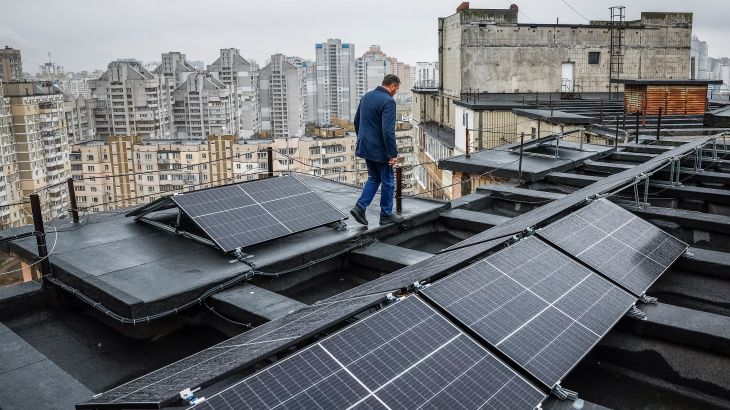As Trump turns to fossil fuels, Europe sprints ahead with renewables
Solar and wind power are replacing coal and gas in power generation, but experts warn of hurdles ahead.
 Video Duration 28 minutes 30 seconds
Video Duration 28 minutes 30 seconds
28:30
Why is Donald Trump pivoting to fossil fuels?
By John T PsaropoulosPublished On 23 Jan 202523 Jan 2025
Clean energy sources provided a record 47 percent of European electricity last year, powering ahead of fossil fuels.
A new report from Ember, a London-based think tank, found that solar power achieved record growth to give Europe 11 percent of its electricity and overtook coal for the first time.
Recommended Stories
list of 3 itemsend of list
Solar and wind power together surpassed gas, which has declined for the past five years.
These are important milestones towards achieving a European goal of reducing greenhouse gas emissions by 55 percent relative to 1990 levels by 2030.
Europe’s power sector emissions have now fallen to less than half their 2007 levels, Ember found.
This has happened because politicians of all stripes backed renewables, the report said.
“Many national and European elections bred concerns that the transition to clean energy would lose support. On the contrary, progress continued at pace,” said the report.
Some of that shared political impetus is economic.
Since 2019, solar and wind power have saved Europeans 59 billion euros ($61bn) in fossil fuel imports, Ember found, most of it gas.
Advertisement
During those five years, fossil fuels’ share of the power sector fell to 29 percent, while renewables grew.
‘US risks being left behind in the clean industrial revolution’
Europe has few resources of oil and gas and currently spends about half a trillion dollars a year importing fossil fuels. Its main hope for energy autonomy is in developing renewables.
In contrast, the United States is the world’s largest oil producer and exporter of liquefied natural gas (LPG), and President Donald Trump wants to increase LPG production further.
On Monday, his first day in office, he declared a national energy emergency that would fast-track drilling and pipeline construction permits.
He also signed an executive order temporarily freezing all US onshore and offshore wind farms.
Those policies signal differences between the US and Europe on energy.
“The US is diverging from global trends on wind power,” said Dave Jones, insights director at Ember. “Major economies are embracing wind as a source of cheap, clean electricity.
“The US risks being left behind in the clean industrial revolution.”
The US produced just 10 percent of its electricity from wind energy last year, compared to 17 percent in Europe and 29 percent in the UK, Ember found.
On January 7, Trump said leasing areas of ocean for wind farms destroyed their value because it put them out of reach of oil and gas producers.
Hours before he signed the executive orders, during his inauguration, Trump said, “America will be a manufacturing nation once again, and we have something that no other manufacturing nation will ever have: the largest amount of oil and gas of any country on Earth.”
Advertisement
Kostis Stambolis, the head of the Athens-based Institute of Energy for Southeast Europe (IENE), told Al Jazeera, “The US is currently autonomous in oil and gas, producing 20mn barrels of oil-equivalent a day.
“Trump wants to make it an export powerhouse in both.”
The US is not the only country increasing energy supply.
Several other nations, including Australia, Qatar and Mauritania, have announced new gas liquefaction trains, which will increase supply and lower prices.
“We believe there’s going to be an LNG glut globally from 2026 to 2030, and that will lead to fierce competition and a fall in prices,” said Stambolis. “That will cover Europe’s needs more cheaply. What effect it will have on the development of renewables is very difficult to say.”
Ember believes Europe will continue to invest in autonomy.
“The EU is striding closer towards a clean energy future powered by homegrown wind and solar,” wrote Beatrice Petrovich, who co-authored the report. “This new energy system will reduce the bloc’s vulnerability to fossil price shocks, tackle the climate crisis and deliver affordable energy.”
‘Replacing fossil fuels in transport is harder’
Not every energy analyst is confident Europe will succeed.
“Renewables in electricity are the ‘easy’ part of the transition, especially at a time of high fossil fuel prices. Replacing fossil fuels in transport is harder, and in the heat sector still harder,” Professor Jonathan Stern, who leads the Oxford Institute of Energy Studies, a think tank, told Al Jazeera.
Advertisement
Apart from Europe’s ambition to be the first climate-neutral continent by 2050, two things, in particular, have spurred its transformation.
The COVID-19 pandemic in 2020 led to the creation of a fund designed to pull Europe out of recession.
The Recovery and Resilience Fund, as it was called, fertilised 1.8 trillion euros ($1.87 trillion) in investments, a third of them in green energy.
Russia’s full-scale invasion of Ukraine in 2022 further accelerated Europe’s flight from fossil fuels as Russia cut pipeline gas flows to the continent in an apparent effort to blackmail Europe into stopping military assistance to Kyiv.
Previous Ember reports have found that Europe’s solar and wind energy sectors grew at record rates of 5 percent in 2022 and again in 2023.
Meanwhile, Europe switched to buying liquefied natural gas (LNG) from other producers, such as the US, Australia and Qatar.
Russia has got in on the act, investing in liquefaction and shipping its gas in LNG carriers to disguise its origin as Russian.
Stern warned that these transformations in the gas market have given renewables a boost that may be temporary.
“Gas prices have been extremely high in 2024 because of the transition from Russian gas to LNG where we are in a tight global market. This hugely benefitted renewables,” he said.
